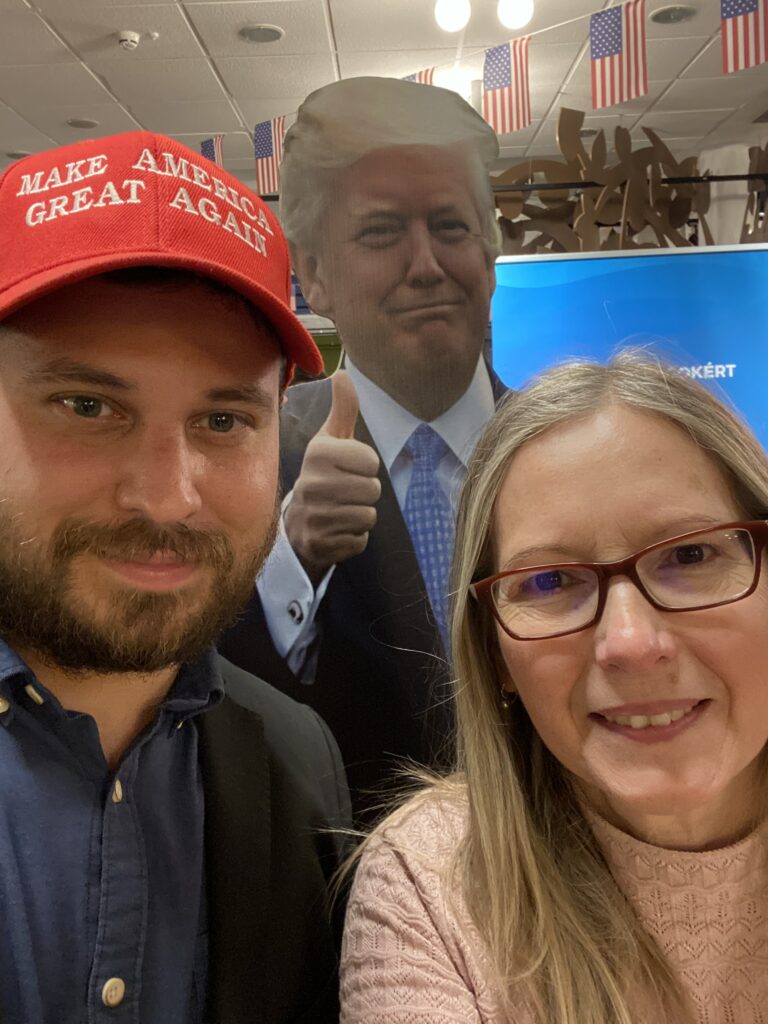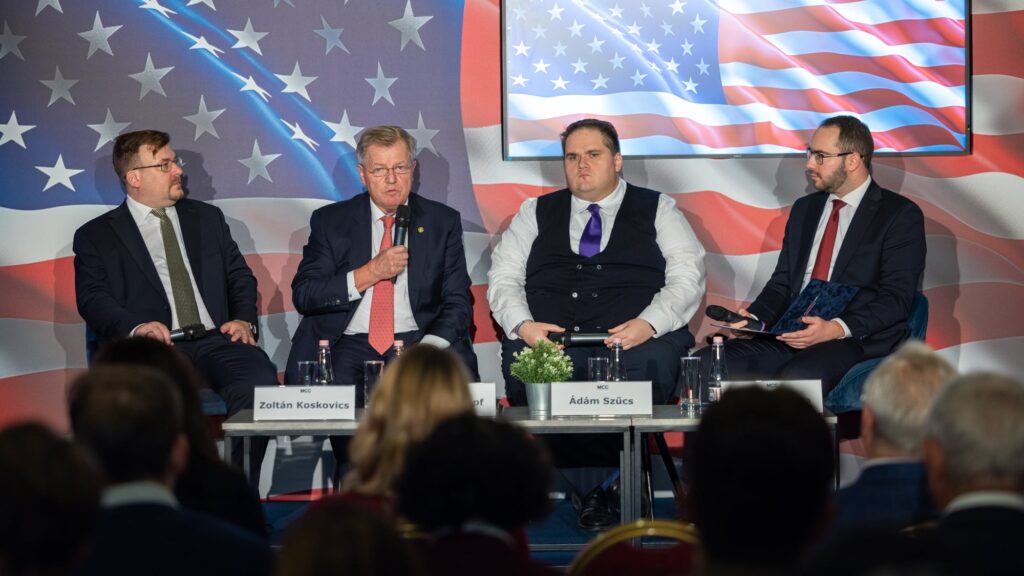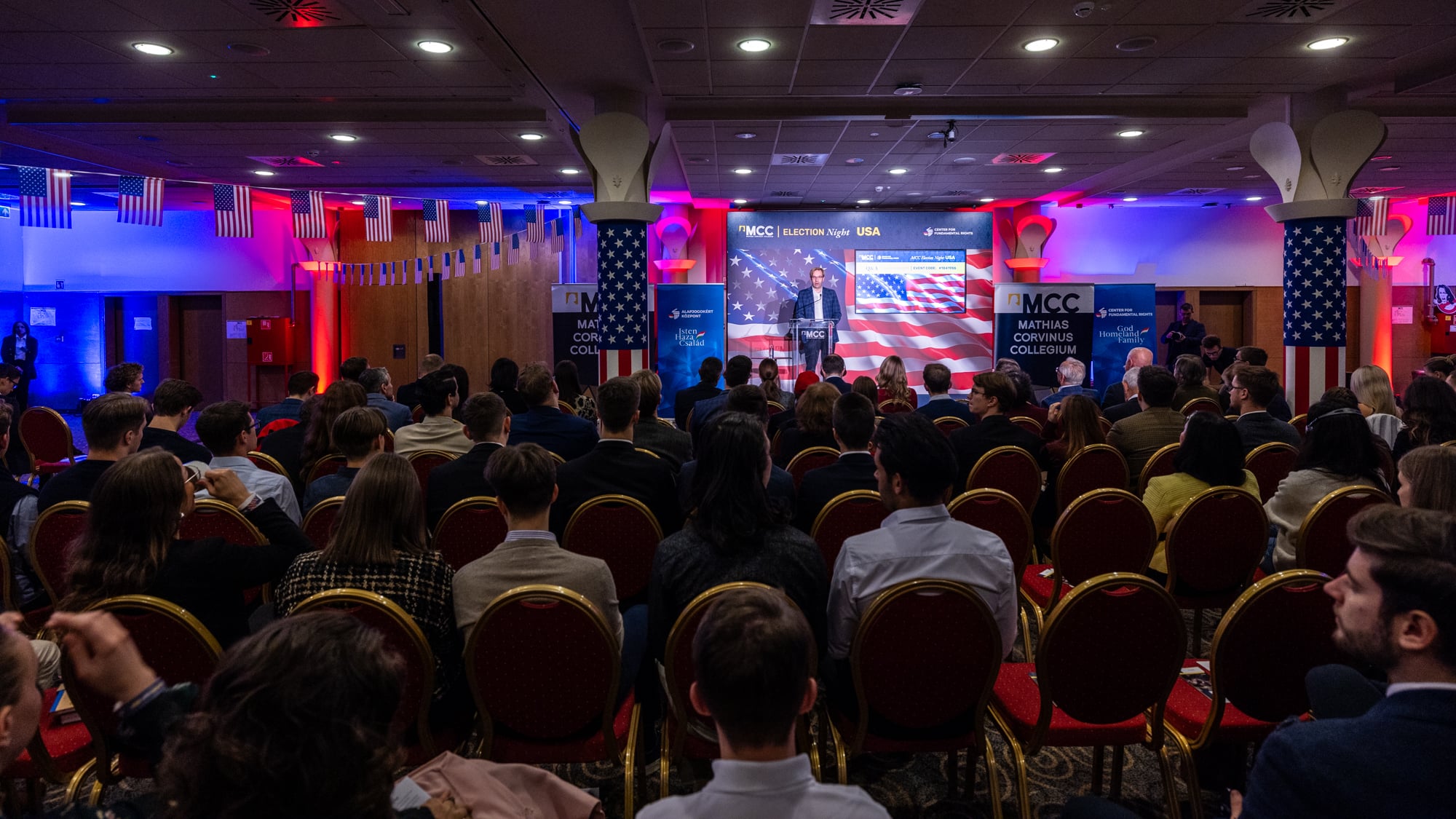The Center for Fundamental Rights and Mathias Corvinus Collegium hosted a vibrant election night today, ahead of the substantive results of the historic US presidential election coming in. The venue, MCC’s 11th district campus was decorated in truly US-election-frenzy fashion, with US flags, life-size cut out figures of Trump and Harris, and blue and red lighting evoking the US national colours. Some of the attendees donned MAGA hats, and the general mood and the stance of the experts sitting on the panels featured during the evening was, unsurprisingly for a conservative crowd, definitely pro-Trump. Hungarian Conservative was also represented at the event.
In front of a packed house, MCC Director General Zoltán Szalai welcomed the audience, reminding that 2026 will mark the 250th anniversary of the Continental Congress adopting the Declaration of Independence, a document that was ‘one of a kind’ declaring a new nation’s sovereignty based on universal human values. Since then, as Mr Szalai put it, the ‘American experiment has been ongoing,’ however, it is unclear to him whether ‘it is going swimmingly or not’ based on the external and internal tensions within the United States at this point in time. What is clear to him, however, is that ‘America needs a stable leader right now,’ in order to achieve peace on the world stage again. He reminded that ‘it is the American people who have the right to decide their fate,’ and Hungary is in no way trying to influence that decision.
Director General Miklós Szánthó of the Center for Fundamental Rights spoke next. He declared the fundamental question at stake in this election is ‘war or peace’. He went on to point out that there had been a tight friendship between the Hungarian and the American right in the last few years, and the annual CPAC Hungary in Budapest is the most tangible manifestation of that. He also stated that ‘there have not been any real political questions at stake in US presidential elections since Ronald Reagan,’ and since then a so-called ‘uniparty’ has formed with no major policy differences between the candidates like George W Bush and Al Gore, or Mitt Romney and Barack Obama. Mr Szánthó stated that a great example of that is that Former Vice President Dick Cheney, once intensely loathed by all Democrats, is now endorsing Kamala Harris.
This all changed when Donald Trump stepped onto the scene in 2015, the speaker said, as he provided a real alternative to the globalist, woke ideology and open borders. He has been through a brutal campaign season this year, with civil suits, a criminal conviction, and two assassination attempts. Meanwhile on the Democrat side, the party leaders got rid of their sitting President as the nominee in a coup, despite him winning the primary. They chose Vice President Harris instead, whom Mr Szánthó described as ‘not particularly likeable or talented’. The two candidates represent two very distinct visions for the future, he noted, Vice President Harris that of ‘war, open borders, and woke ideology,’ while President Trump that of ‘no migration, no gender, and no war’.
‘On the Democrat side, the party leaders got rid of their sitting President as the nominee in a coup’
Speaking with Hungarian Conservative, Mr Szalai noted that considering America’s role as the number one power in the world, the US presidential election has relevance globally, but especially for Hungary, as the current Democrat administration has not been very friendly towards out country. Depending on who wins the election, things could get even worse, or definitely better with a Trump administration, whether it is about dual taxation or what kind of ambassador we get. Mr Szalai revealed that he personally is rooting for a Trump victory, as probably all of those gathered in the halls of the MCC campus. When asked what his prediction is regarding the actual outcome of the voting, he said he shared Center for Fundamental Rights Director Szánthó’s opinion that either Trump will win by a landslide, or he will lose by a small margin.

In the first panel, moderated by senior analyst of the Center for Fundamental Rights Levente Szikra, Center geopolitical analyst Zoltán Koskovics, István Stumpf, member of the Prime Minister’s Strategic Advisory Board and former Constitutional Court justice, and Ádám Szűcs, research fellow at the Center for Diplomacy looked at the most important issues that have been at the centre of the US presidential election campaign. Koskovics highlighted that inflation is a central worry for the average voter, with the other panellists also calling attention to the cost of foodstuffs becoming exorbitantly high and rental prices also skyrocketing, partly due to the influx of masses of migrants into US communities. Reflecting on that, Szűcs noted the parallel realities that voters live in, with there being no overlap in the top five issues that Republican and Democrat voters name as of major concern to them.

Discussing whether there are typical Republican or Democrat voters, the panellists agreed that to some extent yes: middle-aged white men probably vote Republican, while single urban women probably Democrat. Koskovics stressed that identity-based politics is very much in the focus in the US, but the traditional preferences of ethnic minorities are changing: more and more African Americans opt for the Republican party, and Latinos are also turning towards the Republicans in growing numbers. According to Stumpf, there is also a struggle of identities in terms of class, with working class Americans turning away from progressive Democrats because they feel betrayed by the elitist, progressive left. He pointed out that evangelical Christians are overwhelmingly pro-Trump, but he also added that religiosity as such is declining in importance as a nation-sustaining force in the United States.
The panellist also expressed doubts about whether an election can be called democratic at all in which proof of ID is not a prerequisite of voting in 15 states. Stumpf stressed that early voting as such and ballot drop boxes are in themselves problematic, to which Szűcs added that there are no federal regulations governing voting practices. He cited Florida as an example of a state where voting is well regulated and fairness and lawfulness is ensured. Ádám Szűcs opined that it is certain that the outcome of the election will be questioned whoever wins, with Stumpf adding that the legal teams of both campaigns are ready for potential legal recourses.
After the first panel, the authors decided to stop working and mingle, have fun and continue to keep their fingers crossed for the victory of the candidate of their preference. But first they recorded this little video:








